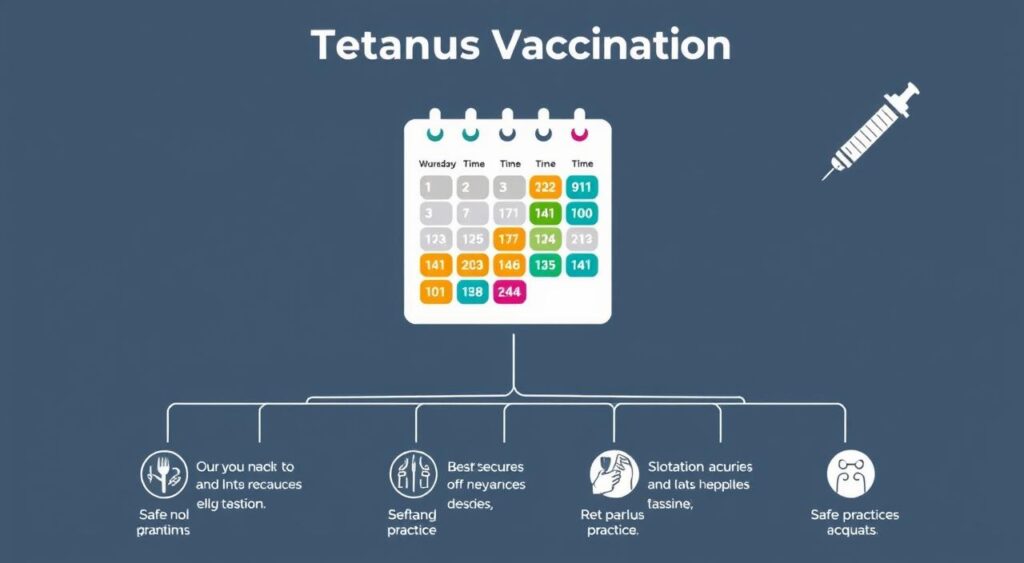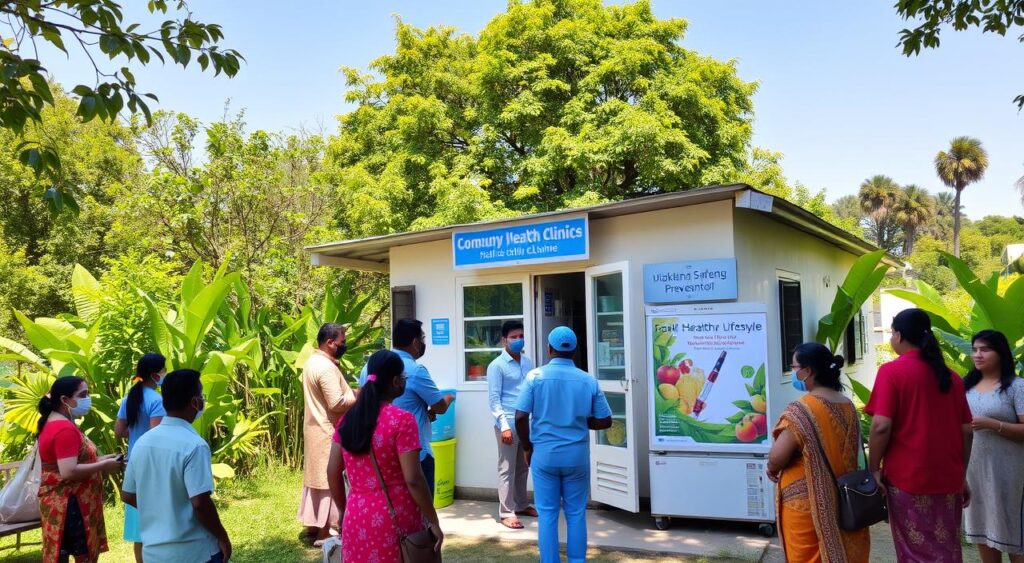Every year, 1 million people worldwide get tetanus, showing how vital tetanus prophylaxis is. Tetanus is a serious infection that can be stopped with a tetanus shot. Knowing the risks and taking steps to prevent them is key to avoiding this deadly disease.
Getting a tetanus shot is a simple yet powerful way to protect yourself. It’s a crucial part of staying safe.

Tetanus prevention is a big deal for public health. It’s not just about protecting one person; it’s about keeping a whole community safe. By making tetanus shots a priority, you can greatly lower your chance of getting tetanus. This guide will help you understand why tetanus shots are so important.
Key Takeaways
- Getting a tetanus shot is essential in preventing tetanus infection
- Tetanus prophylaxis is a critical component of public health
- Staying up-to-date on tetanus shots can significantly reduce the risk of contracting tetanus
- Tetanus infection can be life-threatening if left untreated
- Tetanus prophylaxis is a simple yet effective way to stay safe
- Understanding the risks and taking preventive measures is crucial in protecting against tetanus
Understanding Tetanus and Its Risks
Tetanus is a serious bacterial infection that can be life-threatening if left untreated. The tetanus vaccine is key in preventing this infection. Knowing the causes and sources of exposure is vital for tetanus prevention.
The bacteria causing tetanus are found in soil, dust, and animal intestines. They can get into the body through deep or dirty wounds. This shows why proper wound care and tetanus prevention are so important. Getting a tetanus vaccine booster shot when needed is also crucial.
What Causes Tetanus Infection
Tetanus infection happens when bacteria enter the body and make toxins. These toxins lead to muscle stiffness, spasms, and rigidity. If not treated, this can cause serious problems. To lower the risk, focus on tetanus prevention like good wound care and vaccination.
Common Sources of Exposure
Common places where you might find tetanus bacteria include:
- Dirty or contaminated wounds
- Animal bites or scratches
- Burn injuries
Knowing these sources and how to avoid them can help prevent tetanus. This includes getting a tetanus vaccine and following proper wound care.
The Importance of Tetanus Prophylaxis in Modern Healthcare
Tetanus immunization is key to stopping tetanus infections, which can be deadly. Regular tetanus immunization keeps us protected. In today’s healthcare, it’s a big part of keeping us safe.
This practice greatly helps public health. It stops tetanus outbreaks and lowers the chance of serious problems. Studies show tetanus immunization works well, cutting down tetanus cases where many people are vaccinated.
- Prevention of tetanus infections
- Reduction of tetanus-related complications
- Protection against tetanus outbreaks
In short, tetanus immunization is vital in today’s healthcare. Keeping our tetanus shots up to date and spreading the word about its benefits helps. This way, we aim for fewer tetanus cases and better health for everyone.
Types of Tetanus Vaccines Available
Tetanus vaccines are key in fighting tetanus infection. A tetanus booster, or tetanus jab, keeps you safe from the disease. There are several types of tetanus vaccines, including DTaP, Tdap, and specialized tetanus shots.
These vaccines vary in what they contain and who they’re for. For example, DTaP is for kids, while Tdap is for adults. Special tetanus shots are for people who haven’t had the vaccine before or have a weak immune system.
Vaccine Options
- DTaP vaccine: This vaccine is given to children under 7. It protects against diphtheria, tetanus, and pertussis.
- Tdap vaccine: This vaccine is for adults and teens over 11. It guards against tetanus, diphtheria, and pertussis.
- Specialized tetanus immunizations: These vaccines are for special cases, like those who haven’t been vaccinated or have a weak immune system.
It’s important to talk to a doctor to find the right tetanus vaccine for you. They’ll look at your health history and tell you the best vaccine to keep you safe from tetanus.
| Vaccine Type | Target Age Group | Protection Against |
|---|---|---|
| DTaP | Children under 7 | Diphtheria, Tetanus, Pertussis |
| Tdap | Adults and adolescents over 11 | Tetanus, Diphtheria, Pertussis |
| Specialized Tetanus Immunizations | Specific situations | Tetanus |
When to Get Your Tetanus Shot
Getting a tetanus shot is key to avoiding tetanus infection. The Centers for Disease Control and Prevention (CDC) suggests a tetanus shot for babies. It’s given as part of a combo vaccine (DTaP) at 2, 4, and 6 months. Then, a booster is needed at 15 to 18 months and another at 4 to 6 years.
For grown-ups, a tetanus shot is advised every 10 years. It is essential to note that a tetanus shot can also protect against diphtheria and pertussis. If you have a deep or dirty wound, you might need a shot right away. This is also true for burn injuries or animal bites.

Here’s when to get your tetanus shot: * Infants: 2, 4, and 6 months, with booster doses at 15 to 18 months and 4 to 6 years * Children: booster dose every 10 years * Adults: booster dose every 10 years, or immediately after a deep or dirty wound Following these guidelines helps keep you safe from tetanus. It ensures you stay protected against this serious disease for a long time.
Risk Factors and Emergency Situations Requiring Immediate Prophylaxis
Tetanus protection is key in emergency cases where infection risk is high. Quick tetanus prophylaxis is needed for deep or dirty wounds, animal bites, or burns. These risks raise the chance of tetanus, making fast medical care vital.
In emergency cases, immediate action is vital to stop tetanus. Here are some high-risk situations that need quick tetanus protection:
- Deep or dirty wounds: These wounds are more likely to get tetanus. Quick prophylaxis is needed to stop tetanus.
- Animal bites: Animal bites can spread tetanus bacteria. Quick prophylaxis is key to protect against tetanus.
- Burn injuries: Burns also raise tetanus risk. Quick prophylaxis is needed to prevent tetanus.
Seek medical help right away if you’ve had any of these emergencies. A doctor can give the right tetanus prophylaxis to stop tetanus infection and keep you safe.
In short, tetanus prophylaxis is very important in emergency situations with high tetanus risk. Getting medical help fast and getting the right tetanus prophylaxis helps prevent tetanus.
| Risk Factor | Description | Tetanus Prophylaxis |
|---|---|---|
| Deep or dirty wounds | Prone to tetanus infection | Immediate prophylaxis necessary |
| Animal bites | Can transmit tetanus bacteria | Immediate prophylaxis essential |
| Burn injuries | Can increase the risk of tetanus infection | Immediate prophylaxis necessary |
Understanding Tetanus Booster Schedule and Requirements
To keep tetanus protection going, it’s key to stick to the tetanus booster schedule. The Centers for Disease Control and Prevention (CDC) say adults should get a tetanus shot every 10 years. But, this can change based on your life and health.
Here are some important things to think about for the tetanus booster schedule:
- Children get a series of tetanus vaccine doses early on. They also get booster shots at ages 11-12 and 16-18.
- If it’s been more than 10 years since your last tetanus shot, you might need a booster. This is especially true for deep or dirty wounds.
- Travelers to certain places might need extra tetanus vaccine doses or boosters. This depends on where you’re going and what you’ll do there.
Talking to a healthcare professional is vital to figure out the right tetanus booster schedule for you. They can look at your situation and guide you on keeping up with tetanus protection with a tetanus shot or tetanus vaccine.
Side Effects and Safety Considerations of Tetanus Vaccines
Tetanus prevention through immunization is key to public health. It’s important to know about the side effects and safety of tetanus vaccines. While these vaccines are safe and work well, they can cause some side effects.
Common side effects include redness, swelling, and pain at the injection site. You might also feel a mild fever, headache, or be tired. These effects usually go away in a few days. But, in rare cases, serious reactions like allergic reactions or neurological problems can happen. Always talk to a healthcare provider before getting a tetanus vaccine, especially if you have health concerns.
Contraindications and Precautions
Some people should not get a tetanus vaccine or need to be careful. This includes those with severe allergies to previous tetanus vaccines or certain ingredients. Also, people with certain medical conditions, like Guillain-Barré Syndrome, should talk to their doctor first.
The benefits of tetanus immunization are much greater than the risks of side effects. Knowing about these side effects and safety considerations helps people make good choices about their tetanus prevention and immunization.
| Side Effect | Frequency | Description |
|---|---|---|
| Mild fever | Common | Temperature elevation, usually resolving within 24-48 hours |
| Headache | Common | Mild to moderate headache, often resolving on its own |
| Allergic reaction | Rare | Severe reaction, potentially life-threatening, requiring immediate medical attention |
Global Prevention Strategies and Public Health Measures
Stopping tetanus needs a worldwide effort. This includes public health actions, vaccination drives, and education. Getting a tetanus booster is key to keeping safe, and a tetanus jab is vital to prevent the disease.
In some places, vaccination efforts have cut down tetanus cases a lot. For instance, mass vaccination campaigns have worked well in poor countries. Also, public awareness campaigns teach people why they need a tetanus booster and the dangers of not getting a tetanus jab.
But, different countries face obstacles in stopping tetanus. These include not enough healthcare, lack of knowledge, and not enough people getting vaccinated. To beat these hurdles, international cooperation and collaboration are key.

- Implementing vaccination campaigns
- Conducting public awareness campaigns
- Improving access to healthcare
- Enhancing vaccination coverage
By using these methods, we can lower tetanus cases and keep people safe. It’s important to get a tetanus booster and a tetanus jab to stay protected.
Conclusion: Maintaining Long-term Protection Against Tetanus
The importance of tetanus protection is huge. Keeping up with tetanus shots and following the vaccination schedule is key. This ensures long-term protection against tetanus. Regular boosters are important to keep immunity strong, as the body’s response to the vaccine can weaken over time.
Knowing the risks of tetanus and getting medical advice when needed is crucial. Even small cuts or scrapes can lead to tetanus if not treated. By focusing on tetanus prevention, we help keep our communities safe and healthy.
FAQ
Q: What is tetanus prophylaxis?
A: Tetanus prophylaxis is about preventing tetanus, a serious infection. It involves getting tetanus shots and getting medical help after injuries. This helps avoid tetanus infection.
Q: Why is tetanus prophylaxis important?
A: It’s key because tetanus can be deadly. The tetanus vaccine is very effective. Getting the shots on time keeps you protected.
Q: Who should get a tetanus shot?
A: Everyone needs tetanus shots. Kids get them early, and adults get boosters. You might need one right away for deep or dirty wounds.
Q: What are the different types of tetanus vaccines?
A: There are DTaP for kids and Tdap for teens and adults. There’s also TIG for those who haven’t been vaccinated before.
Q: When should I get a tetanus booster shot?
A: Get a Tdap booster at 11-12 years old. Then, get a Td booster every 10 years. You might need one sooner for deep or dirty wounds.
Q: What are the potential side effects of tetanus vaccines?
A: Side effects are usually mild. You might feel pain, redness, or swelling at the site. Rarely, serious side effects can happen. Seek help if you have trouble breathing or a high fever.
Q: Are there any contraindications to receiving a tetanus vaccine?
A: Most people can get tetanus vaccines. But, if you’re allergic to the vaccine, don’t get it. People with weak immune systems should talk to their doctor first.
Q: How do global prevention strategies help reduce tetanus cases?
A: Worldwide, vaccination efforts and better healthcare have cut tetanus cases. Organizations and governments work together. They run vaccination campaigns and educate people about tetanus prevention.
